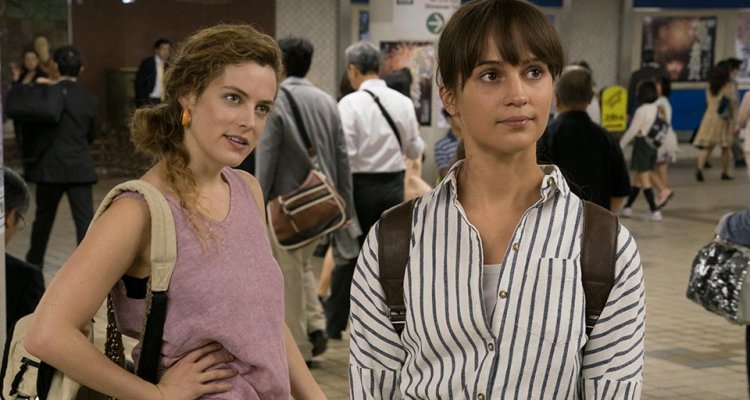Two women, one prim, the other carefree, vie for the same man in Wash Westmorland’s pretty, but ultimately inert, psycho-sexual adaption of Susanna Jones’s prize-winning novel “Earthquake Bird.” Despite a compelling period backdrop in 1980s Tokyo, and featuring two of the best actresses working today, Alicia Vikander and Riley Keough, “Earthquake Bird” is too often stuck in neutral, never fully leaning into either its pulpy set-up or literary aspirations. Playing into Westmoreland’s previous filmic preoccupations, including the sexual reconfigurations that drove his 2018 biopic “Colette,” “Earthquake Bird” never fully realizes either Vikander’s Lucy or Keough’s Lily, instead allowing both to exist as single characteristic enigmas.
Framed around a police integration, in which quiet, prim, film translator Lucy is questioned about the disappearance, and possible murder, of her friend Lily, “Earthquake Bird” mainly exists in flashback. The main narrative concerning Lucy’s budding romantic relationship with cook and amateur photographer, Tieji (Naoki Kobayashi). Often reclusive, and fearing that death follows her around, Tieji’s photographic, and ultimately sexual, interest in Lucy opens her up, as she gains needed confidence from her mysterious new boyfriend. That he never shows his photographs and has locked file cabinets containing pictures of other women hints at the disappearance to come.
Yet, the introduction of hard partying, and carefree, Lily into Lucy’s life upends her seemingly idyllic relationship, as she is forced to compete for the sexual attention of Tieji. Having lived in Tokyo for a number of years, the women’s friendship initially takes the form of Lucy showing Lily around, getting her an apartment and teaching her basic Japanese. But, soon Tieji’s interest moves from Lucy to Lily, sending the former into an emotional tailspin.
For a purported thriller, “Earthquake Bird” oddly forgets its framing device for long stretches, essentially ignoring Lily’s disappearance, and Lucy’s interrogation until the film needs some type of transition. More concerned with attempting to mimic Lucy’s fragile headspace, Westmoreland often relies on subjective scenes, in which the viewer is forced to question the reality presented. But, and not to spoil anything, this formal device doesn’t really go anywhere. Those wondering if Lucy is really crazy or if Lily and Tieji are purposely confusing her will be disappointed in a rote ending that is more out of “Fatal Attraction” than anything else.
While often dramatically stagnant, “Earthquake Bird” is nonetheless aesthetically beautiful, as Westmoreland plays up the neon glow of the 1980s, confining a lot of the film either to the interrogation room or Tieji’s apartment. Similarly, Vikander and Keough are, as always, great. A third-act monologue by Vikander, as she explains why she moved to Tokyo, and why death will not leave her alone, is some of the best acting she’s done to date. While Keough’s hyper-sexualized expat is similar to previous roles she’s played, including “Under the Silver Lake,” she’s more than effective at conveying why Tieji would choose her.
Unfortunately, “Earthquake Bird” is neither thrilling nor really all that mysterious. When the end “twist,” if we can even call it that, comes around, it’s an afterthought. Despite being beautifully filmed and featuring stand-out performances, the surrounding film is lifeless, favoring a lethargic mood over any type of narrative thrust. [C]

